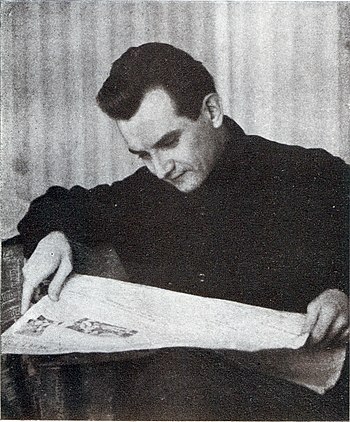Yevhen Pluzhnyuk
1989–1936
Pluzhnyk, Yevhen [Плужник, Євген; Plužnyk, Jevhen], b 26 December 1898 in Kantemyrivka, Bohuchar county, Voronezh gubernia, d 31 January 1936 in the Solovets Islands. Writer. In the years 1923–8 he belonged to the Kyiv writers' groups Aspys, Lanka, and MARS and contributed poetry to several Soviet Ukrainian journals. During his lifetime he published only two poetry collections, Dni (Days) in 1926 and Rannia osin’ (Early Autumn) in 1927; a third, Rivnovaha (Equilibrium), first appeared posthumously in an émigré edition in Augsburg in 1948. He also wrote the novel Neduha (Illness, 1928), which was banned from circulation shortly after its publication. Two of his plays, Profesor Sukhorab and U dvori na peredmisti (In the Courtyard in the Suburb), appeared in Zhyttia i revoliutsiia in 1929; a drama in verse, ‘Shkidnyky’ (Wreckers), was never published. He also translated Russian literature into Ukrainian and compiled (with Valeriian Pidmohylny) a dictionary of Ukrainian official phraseology (1926) and (with Vasyl Atamaniuk and Feliks Yakubovsky) an anthology of Ukrainian poetry (1930–2). Although Pluzhnyk was one of the finest Ukrainian poets of the 1920s (he has been compared to Rainer Maria Rilke), Party criticism was hostile to his contemplative, laconic, and frequently gloomy lyricism and depiction of revolutionary atrocities and Soviet reality. After his novel was banned from circulation, he published very little. In December 1934 he was arrested together with many other Ukrainian figures, and in March 1935 he was sentenced by a military tribunal to death by firing squad. The verdict was commuted to 10 years' imprisonment in the Solovets Islands in the White Sea, where he soon died of the tuberculosis that had afflicted him since 1926. He was rehabilitated posthumously in 1956, and editions of his collected poems were published in Kyiv in 1966 and 1988. An uncensored edition appeared in Munich in 1979.
* * *
I know that Ploughshares are beaten out of swords. No soil becomes fertile because of This art. Some keys there he that will afford Entrance into the entire heart. I perceive How things are based: Through all the wheat, blood is wove — Only thus people learn the taste Of love, I believe.
* * *
To learn wisdom — others don’t employ: All mistakes must be your very own. Works that have come down to us from Troy Borrowed were, for odes of ancient Rome. Study well, even commas, by the way — And from each line a lesson you’ll partake: Better make your own mistakes than, say, Try to learn from errors others make.
* * *
Night world in beauty wrought. No symmetry. No utterance. Death inclined. Speak not, then; speak not! Who or what throws words to the wind? All the futility of a world beyond, And endless making of little worlds; Has not their meaning long been conned In textbooks for the boys and girls! Yet truly wrought in beauty — the night world!
* * *
Oh, when September-golden comes to pass And, like a laggard wandering, Caresses the silky fleece of autumn grass And cranes are gathered round a water-spring, At night, I love to watch the deeper blue Of autumn's vaults of heaven draw The raining stars, as carpenter would strew The silvery shavings from his moving saw... What fiery light! For nature can afford From weariness to rest in beauty now released — Which is perhaps in truth a high award For summer's passion — grant of quiet peace.
* * *
Just a small town. But climb up the bell-tower — Vista of rye fields and neighbouring farms, Town hall, houses, offices, drug-store — All so familiar, all full of charm. I shall live quietly. Like when Fall is fair... And sit by my gate in the evenin’... Opposite lies the market square — There play the dogs and the children. Folk don't need much, I know, to get by — Just a few memories, a room, some baccy — And sometimes a bit of blue sky. Or the Ninth symphony...